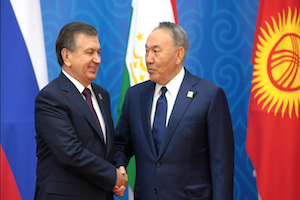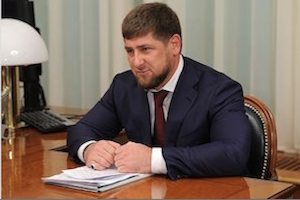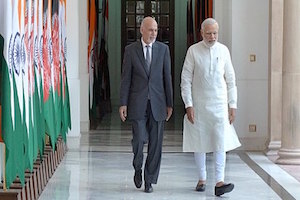Deepening Central Asian Nonproliferation Partnerships
By Richard Weitz
February 22, 2018, the CACI Analyst
Preventing the proliferation of weapons of mass destruction (WMD) has been a priority for Uzbek-U.S. and Kazak-U.S. relations for decades. Uzbekistan and Kazakhstan are surrounded by nuclear weapons states and lie at the crossroads of potential WMD trafficking routes. As the U.S. struggles to keep North Korea and Iran from obtaining nuclear weapons, deny WMDs from terrorists and other actors, and sustain a major security presence in Central Asia, partnering with Uzbekistan and Kazakhstan against WMDs offers low-cost, high-yield opportunities.

Chechnya's Kadyrov Appoints Relatives to Top Jobs Amid Sanctions
By Huseyn Aliyev
February 6, 2018, the CACI Analyst
On December 20, 2017, the Head of Chechen Republic Ramzan Kadyrov was placed on the list of individuals sanctioned under the Magnitsky Act. The sanctions were introduced amid growing repression of dissent and the rapid replacement of top government officials with members of Kadyrov’s clan and family. Kadyrov’s own recent statement about his desire to retire suggests that the Chechen leader seeks to strengthen the influence of his family and clan in the republic’s government, enabling him to take a less formal (albeit similarly powerful) role should such a necessity arise in the future. The revival of the home-grown insurgency this year poses a new threat to the stability of Kadyrov’s regime, which will likely be met with increased repression.

Why Isolating Pakistan Will Not Solve Kabul's Problems
By Rizwan Zeb
August 7, 2017, the CACI Analyst
Afghanistan has been a factor in the rivalry between India and Pakistan since 1947. Prime Minister Narendra Modi has embarked upon a campaign to isolate Pakistan from developments in Afghanistan. The Sixth Heart of Asia summit, held in Amritsar, India in December 2016, was overshadowed by this increasing enmity. Afghanistan’s President Ashraf Ghani sided with Modi, accusing Islamabad of all ills in Afghanistan. New Delhi’s and Kabul’s approach at Amritsar must be avoided in the future. Kabul needs to put its house in order and should not become a party to Indo-Pakistan rivalry. New Delhi and Islamabad also need to understand that expanding this rivalry into Afghanistan will not serve their interests.

EU–China trade to bolster security in the South Caucasus
By Boris Ajeganov
January 23, 2017, the CACI Analyst
Foreign investment in Georgia is strengthening the country’s importance in connecting East Asia with Europe, which has positive implications for the broader region. The rise in FDI in commercial and transportation infrastructure in combination with the signing of international free trade agreements will reduce Georgia’s vulnerability in terms of economic and, ultimately, ‘hard’ security. The growing importance of the South Caucasus as node for EU-China trade will weaken Russia’s incentives to undermine its southern neighbors by military, political, and economic means as it has done in the past. Accordingly, Tbilisi’s ability to conduct an independent foreign policy is set to improve despite the absence of Western security guarantees.
Advancing Georgian-U.S. security cooperation after the Trump transition
By Richard Weitz
January 19th 2017, the CACI Analyst
The Trump administration will soon undertake a comprehensive review of Russia-US relations and U.S. policy toward the rest of Eurasia. Although the new team will presumably consider many options, the president-elect’s statements imply that the U.S. will not soon support further NATO expansion or other actions that would strongly antagonize Moscow. Despite this limitation, the U.S. government will continue security ties with U.S. partners in Eurasia, such as Georgia. In practice, there are a number of steps the U.S. and Georgia can undertake to advance their mutual security.







 Book S. Frederick Starr and Svante E. Cornell,
Book S. Frederick Starr and Svante E. Cornell,